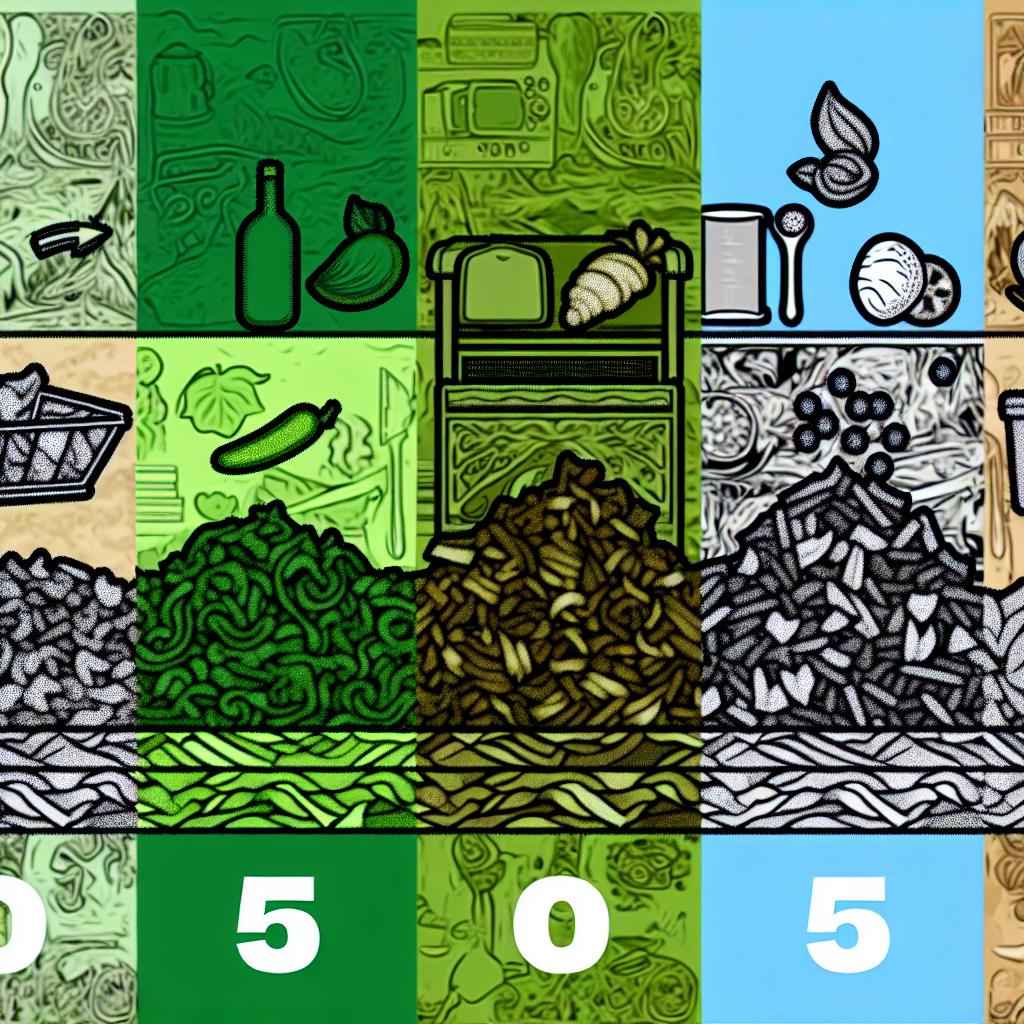Do you want to reduce your household waste and create nutrient-rich soil for your garden? Composting is a great way to achieve both of these goals, but it’s important to do it right. In this article, we’ll explore five common composting mistakes and provide you with practical tips on how to avoid them. Whether you’re a seasoned composter or just getting started, this information will help you improve your composting process and get the most out of your efforts. Let’s dive in and learn how to compost like a pro!
Table of Contents
- Common Composting Mistakes to Watch Out For
- Overcoming Odor Issues in Your Compost
- Avoiding Contamination in Your Compost Pile
- Troubleshooting Slow Decomposition in Your Compost
- Maximizing the Nutrient Value of Your Compost Heap
- Q&A
- In Summary

Common Composting Mistakes to Watch Out For
- Not balancing green and brown materials
- Adding meat, dairy, and oily foods
- Not turning or aerating the compost pile
- Using materials treated with chemicals
- Not monitoring moisture levels
Composting is a great way to reduce waste and create nutrient-rich soil for your garden. However, there are some common mistakes that can hinder the composting process. One mistake to watch out for is not balancing green and brown materials. Green materials, such as fruit and vegetable scraps, provide nitrogen, while brown materials, like leaves and paper, provide carbon. It’s important to have a good balance of both to ensure the compost breaks down properly.
Another mistake to avoid is adding meat, dairy, and oily foods to the compost pile. These items can attract pests and create unpleasant odors. It’s best to stick to plant-based materials for composting. Additionally, not turning or aerating the compost pile can slow down the decomposition process. Turning the pile regularly helps to introduce oxygen, which is essential for the breakdown of organic matter.

Overcoming Odor Issues in Your Compost
Composting is a great way to reduce waste and create nutrient-rich soil for your garden. However, many people struggle with odor issues when composting. Fortunately, there are several common mistakes that can lead to unpleasant smells in your compost, and they can be easily avoided.
One common mistake is adding too much food waste to your compost pile. When food waste breaks down, it can produce strong odors. To avoid this, be sure to balance your compost with a mix of green materials (like fruit and vegetable scraps) and brown materials (like leaves and paper). Another mistake is not turning your compost regularly. Turning your compost helps aerate it and prevent anaerobic conditions that can lead to odor issues. Additionally, be mindful of what you’re adding to your compost. Avoid adding meat, dairy, and oily foods, as these can also contribute to unpleasant smells.

Avoiding Contamination in Your Compost Pile
When it comes to composting, is crucial for creating nutrient-rich soil for your garden. Here are 5 common composting mistakes and how to avoid them:
- Adding meat and dairy products: These items can attract pests and slow down the composting process. Stick to plant-based materials like fruit and vegetable scraps, coffee grounds, and eggshells.
- Not turning the pile: Turning your compost pile regularly helps aerate the materials and speed up decomposition. Aim to turn the pile every 1-2 weeks to ensure even breakdown.
- Adding too much water: While moisture is essential for composting, adding too much water can create a soggy pile that lacks oxygen. Aim for a damp, but not wet, consistency.
By avoiding these common mistakes, you can ensure that your compost pile remains free from contamination and produces high-quality compost for your garden.

Troubleshooting Slow Decomposition in Your Compost
Slow decomposition in your compost can be frustrating, but it’s often the result of common mistakes that are easy to avoid. By troubleshooting the issues causing slow decomposition, you can get your compost back on track and turn your organic waste into nutrient-rich soil for your garden.
Here are some common composting mistakes to watch out for, along with tips on how to avoid them:
- Not enough moisture: Compost needs to be damp, but not waterlogged. If your compost pile is too dry, it will decompose slowly. Keep it moist by adding water as needed.
- Imbalance of green and brown materials: Compost needs a mix of nitrogen-rich green materials (like fruit and vegetable scraps) and carbon-rich brown materials (like leaves and straw). Make sure you have a good balance of both types of materials in your compost pile.
- Insufficient aeration: Compost needs oxygen to decompose properly. Turn your compost regularly to aerate it and speed up the decomposition process.
| Mistake | Solution |
| Adding meat or dairy products to the compost | Avoid adding these materials, as they can slow down decomposition and attract pests. |
| Compost pile is too small | Make sure your compost pile is at least 3 feet wide and 3 feet tall to generate enough heat for decomposition. |

Maximizing the Nutrient Value of Your Compost Heap
Composting is a great way to reduce waste and create nutrient-rich soil for your garden. However, there are some common mistakes that can prevent you from . By avoiding these mistakes, you can ensure that your compost is as nutrient-dense as possible.
One common mistake is not balancing the carbon and nitrogen levels in your compost heap. This can result in a slow decomposition process and a less nutrient-rich end product. To avoid this, make sure to add a mix of “green” materials high in nitrogen, such as fruit and vegetable scraps, and “brown” materials high in carbon, such as leaves and straw. Another mistake is not turning your compost regularly. Turning your compost helps aerate it and speed up the decomposition process, resulting in a more nutrient-dense end product.
Additionally, using materials that are treated with chemicals or pesticides can also reduce the nutrient value of your compost. Make sure to only use organic materials in your compost heap to avoid this issue. Finally, not maintaining the right moisture levels in your compost heap can also hinder nutrient production. Keep your compost heap moist, but not too wet, to ensure that the decomposition process is happening at an optimal rate.
Q&A
### What are the most common composting mistakes that people make?
### How can I avoid creating a smelly compost pile?
### What should I do if my compost pile is not heating up?
### What are some common items that should not be added to a compost pile?
### How can I speed up the composting process and ensure a successful outcome?
In Summary
We hope this article has helped you understand some of the common mistakes people make when composting and how to avoid them. By following these tips, you can ensure that your composting efforts are successful and that you are contributing to a healthier environment. Remember, composting is a simple and rewarding way to reduce waste and create nutrient-rich soil for your garden. Happy composting!

